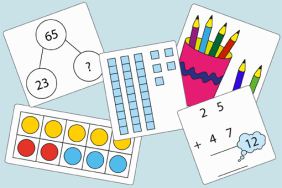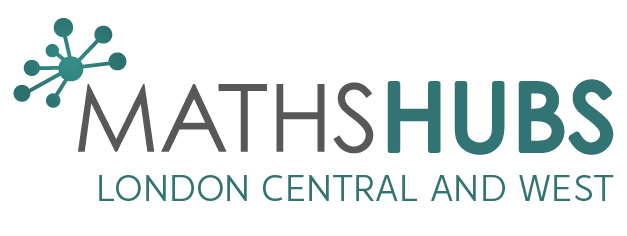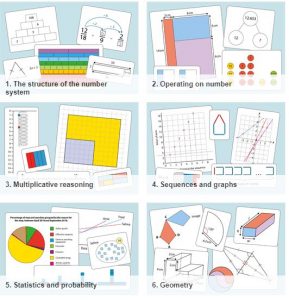NCETM MASTERY SUPPORT MATERIALS FOR PRIMARY
Successful teaching for mastery depends to a large degree on a teacher’s subject knowledge, as well as their understanding of the learning steps required, and the order of those steps. Teaching based on knowledge of mathematical structures and relationships gives pupils the best chance of building deep and secure mathematical understanding. To that end, these materials are designed to assist teachers in their own professional development.
We’ve split the curriculum up into five areas – we call these ‘spines’ – and we’re starting where children start: with number, addition and subtraction.
 All spines should be in place by August 2019.
All spines should be in place by August 2019.
NCETM MASTERY SUPPORT MATERIALS FOR SECONDARY
Teaching for mastery is teaching that aims for deep and sustainable learning; learning that is rooted in an appreciation of the connectedness of mathematical ideas and based on an understanding of the underlying structures. It emphasises the need to go beyond being able to memorise facts and practise procedures and routines.
Such teaching requires us to ‘look through’ the national curriculum statements of content and descriptions of what students need to be able to do. We must discern what students need to be aware of and understand in order to do these things fluently. These materials therefore offer a more ‘fine-grained’ description of the key themes and big ideas of the curriculum by detailing:
- six broad mathematical themes
- a number of core concepts within each theme
- a set of ‘knowledge, skills and understanding’ statements within each core concept
- a collection of focused key ideas within each statement of knowledge, skills and understanding.
The materials are most effective when explored with colleagues. You will find them useful for collaborative professional development based around planning lessons, sequences of lessons and schemes of work. They allow for autonomy and flexibility. Some key ideas are extensively exemplified to demonstrate what planning for deep understanding might involve. Others are left for individual departments and teachers to work on, alongside existing material and schemes. If you wish to create your own guidance documents, similar to the ones found at the links below, you can use this downloadable template.
Please note that these materials are principally for professional development purposes. Unlike a textbook scheme they are not designed to be directly lifted and used as teaching materials. The materials can support teachers to develop their subject and pedagogical knowledge and so help to improve mathematics teaching in combination with other high-quality resources, such as textbooks.
EYFS Progression Documents
The first few years of a child’s life are especially important for mathematics development. Research shows that early mathematical knowledge predicts later reading ability and general education and social progress(ii). Conversely, children who start behind in mathematics tend to stay behind throughout their whole educational journey(iii).
The objective for those working in Early Years, then, is to ensure that all children develop firm mathematical foundations in a way that is engaging, and appropriate for their age. The materials in this section of the website are primarily designed to support Reception teachers (those working with 4-5 year olds), and are based on international research.
The materials are organised into key concepts (not individual objectives), which underpin many early mathematics curricula. The typical progression highlights the range of experiences (some of which may be appropriate for younger children) but the activities and opportunities could be developed across the Reception provision.
There are six key areas of early mathematics learning, which collectively provide a platform for everything children will encounter as they progress through their maths learning at primary school, and beyond:
- Cardinality and Counting
- Comparison
- Composition
- Pattern
- Shape and Space
- Measures.
You can explore these areas in further detail in a special Early Years episode of our podcast with Dr Sue Gifford and Viv Lloyd.
These areas form the fundamental mathematical basis of a CBeebies series of five-minute animated programmes called Numberblocks. The NCETM has provided support materials linked to the Numberblocks programmes. These are designed to help Early Years practitioners draw out and build on the maths embedded in the stories contained in each episode.
Assessment Materials
To help teachers make judgements on the degree to which pupils have acquired mastery of the mathematics curriculum, the NCETM, working in conjunction with the Maths Hubs programme, has produced a series of questions, tasks and activities, mapped against key topics of the National Curriculum.
The materials, produced in collaboration with Oxford University Press, are divided into six separate documents, one for each of Years 1 to 6 inclusive.
Each document starts with an introduction to the principles of teaching for mastery and the implications for assessment in mathematics in the context of the new curriculum. The structure and suggested use of the new assessment materials is also explained.
Secondary Assessment Materials
Video material to support the implementation of the National Curriculum
Introduction
This collection of 60 short videos, filmed in a range of school classrooms in 2012 and 2013, shows teaching, and learning, in line with the three overall aims of the new National Curriculum. These aims are that pupils should develop fluency, reason mathematically and be able to solve problems. Research by the Department for Education demonstrates that a key feature of mathematics lessons in high performing jurisdictions is that the development of quick recall, accuracy and fluency in parallel with the development of understanding and reasoning are all required to promote sound mathematical development (See p 70 of the DfE document listed below).
The first video, immediately below, gives a ten-minute overview of the whole library of clips, and their relevance to the new curriculum. Individual videos can be accessed via the buttons further below or the links on the right of this page.
https://www.youtube.com/playlist?list=PLQqF8sn28L9yTV9WxpHw-9BbqRe_f49fr
For up-to-date features and news, look on the NCETM website here.

